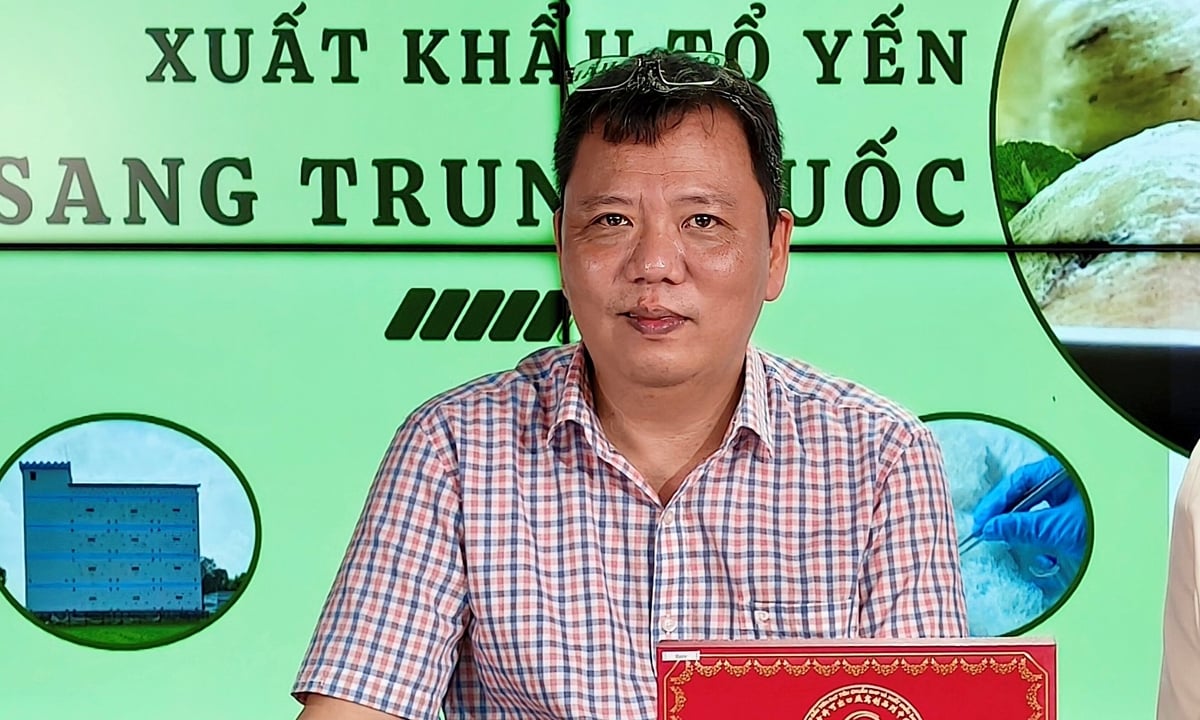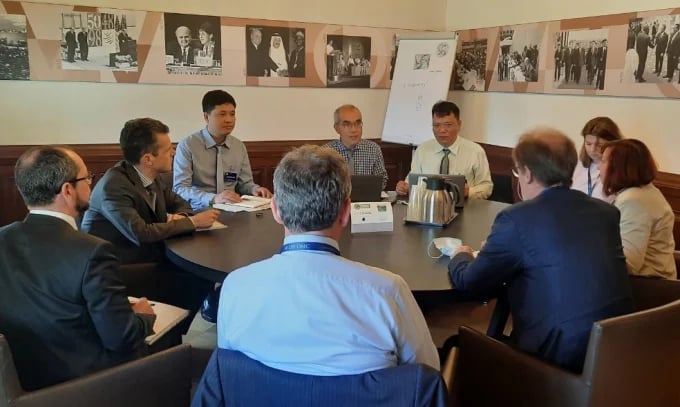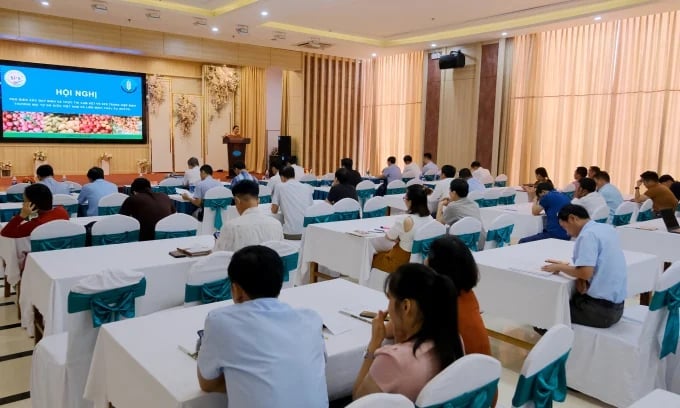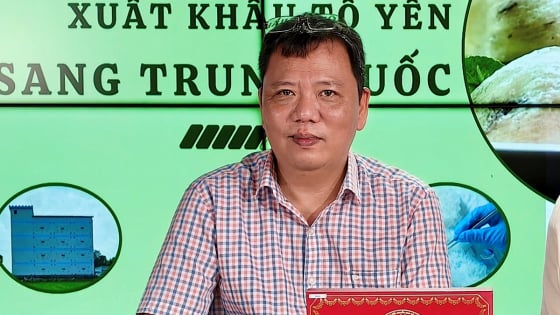(VAN) A multi-channel, multi-directional strategy only works when the agricultural value chain meets global transparency and SPS standards.
No longer a game of low prices or “easy” markets, Vietnamese agricultural products must undergo a strong transformation to adapt to global SPS (Sanitary and Phytosanitary) measures. According to Dr. Ngo Xuan Nam, Deputy Director of the Vietnam SPS Office, three essential “pillars” are: transparency in the supply chain, supporting businesses in compliance, and shifting the management approach from reactive to proactive.

Dr. Ngo Xuan Nam recently participated in a seminar on bird’s nest exports with the Vietnam Agriculture and Nature Newspaper. Photo: Bao Thang.
Transparency of information to enhance competitiveness
In the context of deepening international integration, Vietnamese agricultural products face not only price competition but also increasingly stringent regulations on food safety and animal and plant health (SPS).
Dr. Ngo Xuan Nam believes that market access should go beyond merely expanding exports; it must be rooted in transparency throughout the entire value chain — from production and packaging to traceability.
The multi-channel, multi-directional strategy that many businesses are pursuing is not merely about expanding market share, it is also an opportunity to standardize products and strengthen trust with partners. Each distribution channel, whether it be supermarkets, traditional exports, or e-commerce, comes with its own set of requirements for labeling, preservation, and shipment data. Meeting these diverse requirements in a synchronized manner forces businesses to ensure transparency throughout the entire production process.
In practice, many products such as Dong Thap mangoes and Bac Giang lychees have adopted QR codes that allow traceability down to individual farming households. Mr. Nam believes that real-time public access to data not only boosts trust from import partners but also helps domestic authorities better monitor the supply chain. “Transparent product information is the passport that allows our agricultural goods to go farther,” he said.
Transparency is also the foundation for building a responsible SPS ecosystem – a key objective of the project titled “Enhancing the effectiveness of SPS Agreement Implementation and SPS Commitments in FTAs”, under Decision No. 534/QD-TTg issued by the Prime Minister. By 2030, Vietnam aims to align all national standards for agricultural, forestry, and fishery products with international benchmarks, while also developing a national SPS database that is interoperable among all relevant stakeholders.
“Transparency in Vietnam’s SPS information, along with that of WTO members, will create a stable environment for businesses, cooperatives, and producers to operate with confidence. Transparency in product information and production processes will foster global consumer trust in Vietnamese agricultural products,” emphasized Dr. Ngo Xuan Nam.

The SPS Vietnam Office chaired a bilateral meeting with a trade partner on the sidelines of the WTO/SPS Committee Conference. Photo: SPS Vietnam.
Supporting businesses to bridge the gap between policy and practice
In the past, Vietnamese enterprises often prioritized exports to so-called “easy” markets with fewer technical barriers. However, in today’s era of globalization, countries, including those in ASEAN and the Middle East, have established and tightened their SPS measures, covering everything from pesticide and antibiotic residues to traceability and product labeling. The concept of “easy” or “difficult” markets no longer applies, as all importing countries are enforcing stricter standards to protect consumers and the health of animals and plants.
Dr. Nam warned: “We can no longer practice agriculture with a traditional mindset, producing goods without a foundation in modern economics. If businesses do not proactively understand and comply with international regulations, the risk of being excluded from the supply chain is very real.”
To support effective implementation by businesses, in 2025, the Vietnam SPS Office, in coordination with the Department of Digital Transformation under the Ministry of Agriculture and Environment, will launch the National SPS Information Portal. This platform will provide timely updates on SPS measures from WTO members, standardized guidance for documentation, and user-friendly materials tailored to specific target groups. It serves as a technical foundation enabling businesses, cooperatives, and producers to stay informed of SPS requirements and proactively adapt to them.
In addition, the Vietnam SPS Office is working with local authorities, industry organizations, and media agencies to roll out widespread communication campaigns. Training sessions are being held directly in cultivation and farming areas to help cooperatives and businesses understand and properly apply the regulations. This support model goes beyond theory, it includes sample documents, hands-on guidance, and expert feedback to help enterprises gain confidence in accessing markets.
“Enhancing the capacity to support producers helps narrow the gap between SPS compliance and actual production practices, thereby fostering an agriculture sector that is both compliant and market-oriented,” Dr. Nam observed.

In recent years, the SPS Vietnam Office has closely coordinated with local authorities to organize numerous training conferences for businesses, cooperatives, and farmers. Photo: Bao Thang.
Shifting to a proactive mindset for long-term adaptation
One of the most significant shifts in today’s integration landscape is the rapid pace at which importing countries update their SPS policies. China, a major export market for Vietnamese agricultural products, continuously adjusts inspection frequency, tightens chemical residue standards, and introduces new requirements for labeling, planting area codes, farming zone codes, and packing facility identification. Indonesia has recently notified the WTO of an integrated quarantine model, establishing new standards for imports. Likewise, Japan, the EU, and Arab countries frequently revise their regulations on pesticide residue limits.
Vietnam is currently a member of 17 Free Trade Agreements (FTAs), including several next-generation FTAs such as CPTPP, EVFTA, RCEP, UKVFTA, VIFTA, and CEPA. Proactively and rapidly acquiring knowledge about these FTAs, particularly in relation to agricultural and food exports, is very essential.
“Assigned by the Prime Minister as the focal point for implementing the SPS chapters in new-generation FTAs, the Vietnam SPS Office must take the initiative in research, implementation, and leveraging FTA advantages to boost agricultural exports. This is a strategic, high-priority mission of the Office,” said Mr. Nam.
Vietnam has been exporting agricultural and food products to 200 countries and territories. As a result, businesses must proactively build supply chains and organize production in compliance with the SPS measures specific to each target market. Every country enforces its own SPS regulations, and even within each sector or product category, these requirements can vary significantly.
In fact, individual buyers and supermarket chains often have their own standards and rules. Therefore, proactively segmenting markets and customer groups, and aligning production to meet the specific demands of each, is the guiding principle for promoting the export of agricultural and food products.
“For businesses aiming for long-term success, it is crucial to take the lead in standardizing production areas, adopting digital tools to ensure process transparency, and building product brands based on quality,” said Mr. Nam.
Moreover, according to the Vietnam SPS Office, WTO members issue thousands of SPS-related notifications each year, many of which directly impact Vietnamese agricultural exports. This reality demands that all stakeholders actively strengthen their adaptive capacity to cope with ongoing market changes.
“Transparency in SPS information — Serving businesses and producers — Shifting from passive to proactive compliance with SPS measures can be considered the three pillars that will enable Vietnamese agricultural products to go further in this era of transformation,” emphasized Dr. Ngo Xuan Nam.
Agriculture News | Agri Products Price



